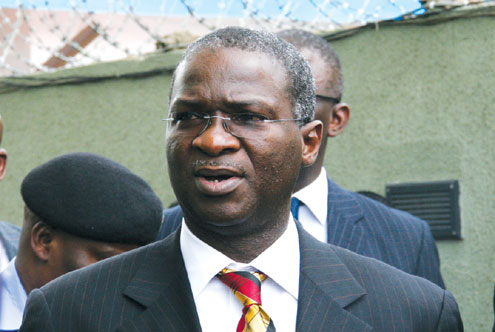The Federal Government has reiterated its commitment toward carbon neutral cities and towns critical for climate resilience in the country.

Minister of Works and Housing, Mr Babatunde Fashola, said this in his keynote address to commemorate the 2021 World Habitat Day and World Cities Day on Monday, October 11, 2021 in Abuja.
The theme of this year’s commemoration is “Accelerating Urban Action for a Carbon-Free World and Adapting Cities for Climate Resilience.”
Represented by Mr Jide Martins, Director, Planning, Research and Statistics in the ministry, Fashola called for increased synergy by all stakeholders to combat carbon emission in Nigeria.
According to him, cities account for 75 per cent of the world’s energy consumption and are responsible for over 70 per cent of global greenhouse gas emissions, with transport, buildings, energy, while waste management forms the bulk of urban carbon emissions.
“The future of our planet depends on national, regional and local governments and organisations, communities, academic institutions and the private sector working together to create sustainable, carbon-neutral, inclusive cities and towns.
“Nigeria currently experiences several challenges associated with climate change. As a demonstration of our commitment to mitigate these challenges, the Federal Government has been making efforts to adapt cities in Nigeria for climate resilience.
“Through the ongoing review of 2012 National Urban Development Policy, the ministry embarked on this review process as a vibrant template that would effectively harness problems of climate change and urbanisation in Nigeria.
“Another clear indicator of our commitment is that we have activated the Roadmap for Nigeria’s Housing and Urban Development Sector and are in the process of producing a National Land Policy,’’ Fashola said.
He added that a strategic National Physical Development Plan to induce far reaching reforms in land administration in Nigeria was in the pipeline for some towns and cities as technical assistance to the states in preparation of Strategic Regional Development Plans.
Fashola said the strategy would provide a platform for the National Physical Development Plan to be prepared based on mutually agreed standards and guidelines for physical development activities and reduce the impact of greenhouse gas emissions across the nation.
The Permanent Secretary in the ministry, Mr Babangida Hussaini, in his remarks, said it was pertinent that well-governed cities reduce climate-related risks for their populations.
“Creating more sustainable climate-resilient communities involve addressing a range of issues, including poverty reduction, ensuring basic services, providing adequate affordable and accessible housing, investing in infrastructure, upgrading informal settlements and managing ecosystems.
“Rapid urbanisation, such as the type we experience in Nigeria, poses several sustainability challenges and thus must be properly managed by proper physical planning and environmental management in order to achieve urban sustainability.
“Therefore, to us and indeed to the global community on this year’s World Habitat and Cities Day is to view the task ahead of us as critical stakeholders as a collective responsibility in accelerating urban action for a carbon-free world,’’ he said.
Hussaini was represented at the occasion by Mr Umana Otoro, Director, Human Resources in the ministry.
Also speaking at the event, the Secretary-General, UN, Mr Antonio Guterres, represented by Mr Paul Okunlola, Country Coordinator, UN-Habitat, said city leadership using green materials and constructing energy-efficient, resilient buildings powered by renewable energy, is essential to achieve net-zero emissions by 2050.
“The benefits are enormous – less pollution and climate risk, more jobs and better health and well-being.
“As populations grow in emerging economies, demand for transport, which accounts for nearly 20 per cent of global carbon emissions, is multiplying.
“Cities are working to ensure that this demand is met by zero-emission vehicles and public transit.
“We need a global moratorium on internal combustion engines by 2040 at the latest to underpin these efforts.
“Let us work together to harness the transformative potential of sustainable urban action for the benefit of our planet and all the people.”
On his part, the President of the Nigerian Labour Congress (NLC), Comrade Ayuba Wabba, also called for a collaborative effort by all stakeholders to reduce carbon emission in the society.
He, however, stressed the need to develop the capacity of the local governments to achieve a healthy environment in the cities, adding that weak local governments would be handicap in enforcing sustainable habitats.
The 2021 World Habitat Day focuses on the state of human settlements devoid of global greenhouse gas emissions.
World Cities Day aims at promoting the international community’s interest in global sustainable urbanisation, pushing forward cooperation among countries in meeting opportunities and addressing challenges of urbanisation, contributing to sustainable urban development around the world.
The World Habitat Day is marked on every first Monday in October and the World Cities Day is marked on October 31 of every year.
By Perpetua Onuegbu and Boluwatife Fadeyi
